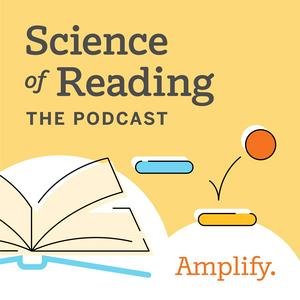In this episode of Science of Reading: The Podcast, Timothy Shanahan, Ph.D., distinguished professor emeritus from the University of Illinois at Chicago, joins Susan Lambert to distinguish between reading comprehension, learning from a text, and the process of learning to read. He compares learning to read with athletic training, explaining that just as athletes need to vary their workout intensities to maximize their strength, students need to vary their text difficulty to maximize their comprehension, reading skills, and overall learning. Together, Timothy and Susan also discuss why reading comprehension is an ethical act and the power of simply rereading to increase comprehension.
Show notes:
Submit your questions on comprehension!
Access free, high-quality resources at our brand-new companion professional learning page
Connect with Timothy Shanahan, Ph.D.
Learn more about Timothy Shanahan, Ph.D.
Read the blog post "Don't Confuse Reading Comprehension and Learning to Read (and to Reread)"
Listen to Leveled reading, leveled lives, with Tim Shanahan, Ph.D.
Listen to Mitchell Brookins, Ph.D. on Beyond My Years
Listen to Season 2 of Amplify’s Beyond My Years podcast
Join our community Facebook group.
Connect with Susan Lambert
Quotes:
"We're trying to teach kids to read, and a text that is immediately comprehensible leaves you very little to learn." —Timothy Shanahan, Ph.D.
"Reading comprehension is not just a psychological or cognitive action—it's an ethical action." —Timothy Shanahan, Ph.D.
"Comprehension is not automatic. It isn't just, 'Oh, if you decode, you're going to comprehend.'" —Timothy Shanahan, Ph.D.
"A good reader has to start out with a determination. 'My job here is to understand it, not just to read it.'" —Timothy Shanahan, Ph.D.
Timestamps*:
00:00 Introduction: Learning to read vs. reading to learn with Timothy Shanahan, Ph.D.
06:00 Reading comprehension is not just a psychological or cognitive action, it's an ethical action.
09:00 Authors know their readers and so they put in affordances aimed at the reader.
15:00 Timothy's motivation for writing his blog post, "Don't Confuse Reading Comprehension and Learning to Read."
17:00 A text that is immediately comprehensible, leaves you very little to learn.
19:00 You can increase the learning for most people if you increase the difficulty.
24:00 An argument for students to read more rigorous texts.
28:00 A good reader has to start out with determination.
35:00 The different between learning and understanding is an issue of remembering.
39:00 Teachers need to teach kids to be strategic.
42:00 Timothy Shanahan's new wrinkle in thinking about comprehension, understanding, and learning.
44:00 In conclusion: Kids should be reading texts with varying levels of difficulty.
*Timestamps are approximate, rounded to nearest minute


